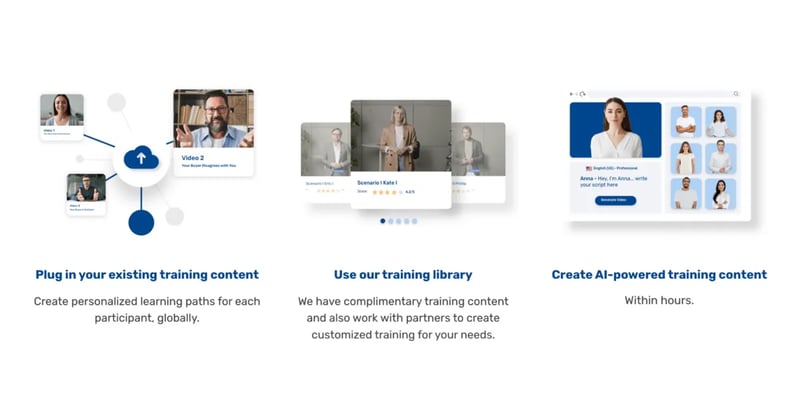A global study of 1,000 sellers and sales managers reported that 71% of top-performing sales representatives receive extremely or very effective sales training.
Sales are, undoubtedly, the engine of your business, and it's safe to say that your company's projected success hinges on your sales team's capabilities.
That's right. The essentiality of possessing an exceptional sales team has never been more critical for an organization, and the path to more closed deals and revenue growth starts with the sales manager's understanding of what it takes to make a good sales rep, and of course, curating a winning sales training program.
Sales teams drive 80% of B2B revenue, but only 35% of companies believe their reps are prepared to meet buyer demands. In an era where buyers ghost reps after one misstep, training isn’t optional—it’s survival.
In this post, you’ll learn:
✅ The 5 non-negotiable skills separating top reps from the pack
✅ Why traditional training fails (and what actually works)
✅ How AI-powered coaching boosts close rates by 42% (real-world case studies)
So without further ado, what makes top sales reps so good at what they do?
What's in this post?
What makes a good salesman?
Sales isn't simply about pitching to a prospect and getting a closed deal. And especially in today's digital business landscape, consumers have access to an unprecedented amount of knowledge, and information at their fingertips.
Their reliance on sales professionals to provide product or service knowledge has decreased; instead, the demand for seamless experiences and personalization of business needs has grown. With the wealth of information at hand, consumers are quicker than ever to scrutinize discrepancies, and loyalty is more elusive with their abundance of choices.
So what does this mean for the sales process, sales game, and your sales professionals?
With the current market that has undergone a profound transformation, the sales skills that are necessary have also changed. Today, forging genuine connections with prospects and conveying stories of success woven through emotional-captivating storytelling, and negotiation skills are the inbound sales fundamentals.
What is a sales training course?
Top sales reps aren't born, they're continuously developing and adding to their skills for their sales career, adapting to the competitive sales industry and rising consumer demands.
Sales training and sales management courses are systematic educational programs targeted towards sales teams with the objective of equipping sales reps and sales managers with the skills they need to effectively and efficiently develop relationships with prospects while prospecting and navigating through the sales process to close more deals.
A sales training program may include various subjects and themes that a rep may need to focus on, including:
- Product knowledge
- Handling objections
- Storytelling
- Negotiation
Why are salesman training courses necessary?
Particularly in the modern business landscape, where companies are navigating through rapidly shifting market dynamics, sales reps receiving continuous access to sales training courses is a foundational element for sales success.
When sales managers make sure their sales professionals are honing their skills and knowledge base through effective sales training courses, they'll see:
-
An increase in win rates
-
An increase in the average size of a sale
-
Be more likely to achieve premium pricing
-
Improve sales margins
-
Grow existing accounts
-
Build a culture of sales achievement
-
Increase the effectiveness of sales leadership and management
What are the top 5 salesman training courses?
Investing in your sales skills is essential to your sales success, and there are a number of traits and characteristics that great sales reps possess, and sales training courses that help them polish these skills.
So, what are the top five training courses that are essential in a sales strategy?
1. Relationship building
A sales professional's ability to cultivate a strong relationship with a prospect is a strategic necessity in a reps toolkit and plays a pivotal role in fostering trust, credibility, and customer advocacy. But often, achieving this unwavering sense of trust and loyalty in prospect or customer relationships is easier said than done.
Active listening, empathy, and personalizing communication strategies to match the prospect's tone and mood are essential skills that require honing and forming the foundational elements of relationship building.
2. Objection handling
When buyers have objections and the sales rep can satisfy them, their success rate is 64%.
Objection-handling skills are no longer just important but are pervasive in a sales rep's toolkit for closing deals and seeing sales success. In fact, facing rejections and handling objections is a huge part of a sales professional's day, no matter how seasoned a rep may be.
What differentiates good sales professionals from great ones, however, lies in their ability to handle and navigate through those objections, and ultimately find a solution to satisfy the customer.
Interested in learning about the top 10 objection-handling training techniques with examples? Take a few minutes to check out our article here!
3. Clarity in communication
In a world brimming with new technologies and intricate ideas, elucidating intricacies and speaking with clarity is the key to mitigating ambiguities within selling strategies and not losing the prospects' attention, especially if it's in a sales pitch.
Practicing communicating value and articulating precision are therefore essential elements of sales training programs.
4. Storytelling
People are more receptive to stories than almost any other type of communication. That's right - a well-crafted sales story has the potential to captivate, resonate, and inspire the prospect.
Not only do human brains enjoy hearing stories, but they remember them and are thus more likely to pass that information on to others. When sales reps storyteller, they aren't just pitching, but they're captivating the listener's attention.
The art of storytelling is more than just about having a beginning, middle, and end. The 5 C's of storytelling is a concept, or a sequence of events, that was established to help people get a better grasp of effective storytelling, which are the following: circumstance, curiosity, characters, conversations, and conflict.

5. Negotiation
The process of a sales rep and prospect coming to an agreement on what each will offer to and take from the other(s) is known as negotiation.
In sales, this negotiation process involves back and forth between the parties with the intention of reaching a goal, frequently involving some concessions.
Even for the most experienced sales managers and sales reps, negotiating with prospects can be a challenge, but when done right, it is the decisive factor between a closed deal or not.
Why Continuous Sales Training Is Essential
In today’s fast-paced business environment, ongoing training is critical to keeping your team ahead of market trends. Companies that regularly invest in advanced training report improvements such as higher win rates, larger deal sizes, and more effective sales leadership. Regular training not only boosts individual performance but also builds a culture of continuous improvement and accountability within your sales organization.
Top 5 Must-Have Sales Training Programs
Effective sales training covers a range of competencies. Here are five key training modules every sales team should include:
-
Relationship Building
Cultivating trust and credibility starts with active listening and empathetic communication. Sales reps who personalize their approach forge stronger customer bonds, which is fundamental to repeat business. -
Objection Handling
Overcoming objections is a daily challenge for sales professionals. Mastering this skill can boost success rates by enabling reps to transform customer skepticism into buying confidence. -
Clarity in Communication
In an era of complex products and services, clear and concise messaging prevents misunderstandings and keeps prospects engaged. Training that refines messaging skills ensures your value proposition is both understood and compelling. -
Storytelling
Data shows that stories capture attention far better than plain facts. A well-crafted narrative not only informs but also inspires prospects to take action, making storytelling an indispensable sales skill. -
Negotiation
Effective negotiation is the linchpin between a deal and a lost opportunity. Training programs that simulate real-life negotiation scenarios help sales reps refine tactics and maintain healthy margins.
What makes a good sales training course?
Lack of interactive features, lack of follow-up of learned skills post-training, and lack of role-plays are just some of the points that contribute to this alarming phenomenon.
So what do sales and L&D managers need to look out for when choosing the right sales courses for their sales teams?
1. They're digital and scalable
Learning cannot be restricted by time or location; this became imperative as the pandemic shifted work-life as we knew it.
This led to organizations employing online sales training courses to keep up with training needs whilst still in remote settings - but despite their benefits, including scalability and remote accessibility, online sales training courses lacked engagement, interactive components, and thus performance improvement within employees.
2. They provide feedback on demand
Immediate, personalized feedback serves as a catalyst for skill refinement and reinforcement.
When reps receive this feedback just when they've done their training, they are able to gain perspective on their strengths and weaknesses and immediately apply their learnings to their next training. This way they are more likely to be in the mindset of changing their behavior.

3. They include role-plays
"Knowing is not enough; we must apply. Wishing is not enough; we must do."- Goethe
When it comes to corporate training, particularly in a field like sales where soft skill requirements are high, it’s important to engage employees on three levels: cognitive, emotional, and behavioral.
That is exactly where role-plays come in.
The best sales training programs understand that sales are not simple, nor straightforward; every prospect has unique needs, motivations, and concerns, requiring different sales techniques.
This means that no single selling strategy will work for all, and no set of lessons or sales books will teach a sales professional the true skill of adapting sales operations to unique customer needs.
Role-plays are indispensable when it comes to honing these professional selling skills. When training incorporates role-plays, reps are given various scenarios they'd likely face on the role, such as dealing with difficult sales prospects, or handling an objection, and can perfect their communication skills over and over before facing the real customer.
4. They calculate ROI
In a volatile business environment, data-driven decision-making is a crucial capability. Companies globally are spending thousands on training programs, but too many are lacking testing real-world outcomes.
Instead, all too often, the sales course tracks the training’s impact by conducting surveys of how many people completed a training course as opposed to assessing whether those reps learned anything that improved business performance or increased sales performance.
In a time where organizations don't have the leniency to waste budget on ineffective training, calculating how every investment is translating to bigger closed deal sizes and creating real value from training is imperative, and serves as useful insights to improve sales training programs constantly.
5. They're available around the clock
The sales industry is a fast-paced, dynamic one. Continuous skill development and adaptability are crucial capabilities within this fast-paced sales domain.
The bottom line is, that a one-a-year sales training workshop or seminar is no longer enough to keep up with the constantly evolving market.
Ideally, a sales team should be able to access skill development whenever they need (for instance, right before a sales call when they want to warm up their negotiation skills) and be able to progress with learning at their own pace.

Benefits of AI-powered sales training courses
Employing AI-powered sales training programs to sales training represents a transformative shift and yields a wealth of opportunities and possibilities for a sales team in an organization.
AI-powered training platforms, such as Retorio's AI Coaching platform, provide a new dimension to sales training with its data-driven approach. In a world where training must be remote and digital, AI's interactive role-plays, combined with personalized feedback on demand and tailored learning paths make sure trainees are fully immersed in their training sessions.
Furthermore, by linking training to direct business impact, organizations no longer have to guess if their training expenses are paying off.

Prominent global enterprises, including one of Germany's largest automotive manufacturers, and one of Europe's largest freight logistics companies, are strategically reaping the plethora of rewards of assimilating artificial intelligence into their sales training programs, such as improved employee performance, sustainable behavior change and embodying a culture of continuous learning.
Ready to Transform Your Sales Team?
Without continuous and effective training, even the most talented sales teams risk falling behind. Embrace a modern, interactive approach to sales training to ensure your team is always equipped to exceed quotas and drive revenue growth.
Without extensive sales training programs for sales reps, organizations are destined to fall short of realizing the potential of even the most advanced technologies.
So, what's the current state of your sales training courses? Are your sales reps equipped with the skills it takes to exceed quota and project revenue for your organization in a time of rising consumer demands and economic volatility?
Make sure they are receiving the constant upskilling needed for today!
Check out our AI-powered sales training platform, and see how it can boost your company's numbers today.
What makes a sales training course valuable for sales teams varies, depending on the organization's industry needs and strategy. However, good sales training courses in today's modern business environment require a few key elements that are imperative to every business:
- Scalable
- Digital
- Include role-plays
- Measure ROI
- Provide on-demand feedback
- Accessable 24/7
The job of a salesman, sales representative or sales professional, is to sell a product or service to a client or customer, with the overarching goal of generating revenue for an organization. The knowledge and techniques required may differ depending on the industry the sales professional works in, for instance, from selling pharmaceuticals to selling cars.





